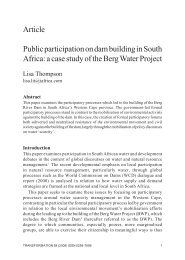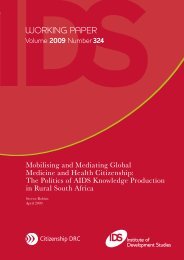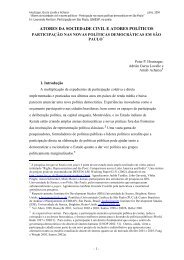IDS WORKING PAPER 285It is striking that, from this base-line <strong>of</strong> common problem salience <strong>and</strong> attribution<strong>of</strong> responsibility, citizens in <strong>the</strong> two cities have quite different patterns <strong>of</strong> civilrelations. Differences in <strong>the</strong> share <strong>of</strong> active citizens <strong>and</strong> relations reveal importantdifferences in <strong>the</strong> nature <strong>of</strong> citizenship in each city, <strong>and</strong> in particular differentdegrees <strong>of</strong> equality with government agents. São Paulo has a clear single pattern<strong>of</strong> citizens-government relations – that is, individuals are most likely to have directrelations to government. A third <strong>of</strong> active citizens in <strong>the</strong> city have direct relations.Fur<strong>the</strong>rmore, a fifth, or 20 per cent, <strong>of</strong> active citizens have contentious relations. Incontrast, <strong>the</strong> high level <strong>of</strong> detached relations (a quarter <strong>of</strong> <strong>the</strong> population) <strong>and</strong> <strong>of</strong>mixed relations (almost half <strong>of</strong> <strong>the</strong> total) suggests that active citizens in Mexico Cityenjoy, relative to São Paulo, less equality. That individuals in Mexico City, <strong>the</strong> seat<strong>of</strong> national government, are more likely to have detached than direct relations isremarkable <strong>and</strong> suggests that a substantial share <strong>of</strong> its residents have difficultymobilising government action, or have given-up on mobilising governmentaltoge<strong>the</strong>r.There is also a strong contrast in <strong>the</strong> share, <strong>and</strong> composition, <strong>of</strong> mixed relations. InSão Paulo mixed relations represent 34 per cent <strong>of</strong> <strong>the</strong> total, <strong>and</strong> most includedirect as one <strong>of</strong> <strong>the</strong> relations. In <strong>the</strong> Mexican capital almost half <strong>the</strong> populationhave mixed relations to government (46 per cent), <strong>the</strong> large majority <strong>of</strong> whichinclude detached. This suggests that <strong>the</strong> civil dimension <strong>of</strong> citizenship is poorlyinstitutionalised in Mexico City, particularly when compared to São Paulo. Citizensare forced to combine multiple types <strong>of</strong> relations to address <strong>the</strong>ir concerns. Evencitizens who have direct relations to government tend to combine <strong>the</strong>se with oneor more <strong>of</strong> <strong>the</strong> o<strong>the</strong>r three types <strong>of</strong> relations. Again, Mexico City residentsattribute primary responsibility to government for issues such as urban services,public order, <strong>and</strong> health care, in much <strong>the</strong> same way as São Paulo residents, <strong>and</strong>have no ideological or normative preference for community action.Figure 4.2 Percentage <strong>of</strong> active citizens, by type <strong>of</strong> civil relations togovernmentNote: Percentage <strong>of</strong> Active Citizens – São Paulo n=464; Mexico City n=73326
IDS WORKING PAPER 285The share <strong>of</strong> <strong>the</strong> population with brokered relations is similar in <strong>the</strong> two cities <strong>and</strong>surprisingly low given <strong>the</strong> characterisation <strong>of</strong> politics found in most <strong>of</strong> <strong>the</strong> literatureon Latin America. We believe that for reasons <strong>of</strong> local political culture <strong>and</strong>difficulties in operationalisation <strong>the</strong>re is some under-reporting <strong>of</strong> such relations. Apart <strong>of</strong> <strong>the</strong> discrepancies between our findings <strong>and</strong> accounts in <strong>the</strong> literature mayalso be explained by our choice <strong>of</strong> cases – <strong>the</strong> countries’ two largest urban centers.The literature has tended to focus on ei<strong>the</strong>r national level political dynamics <strong>and</strong>/orto generalise about countries’ entire political systems based on national dynamics.Our data highlight important analytic gains that can be achieved with a focus onsub-national regimes in countries with considerable regional variation.Summarising, São Paulo has less active citizens than Mexico City, on <strong>the</strong> one h<strong>and</strong>,suggesting that social stratification in <strong>the</strong> former city has a greater impact onactive citizenship. On <strong>the</strong> o<strong>the</strong>r h<strong>and</strong>, those individuals who are active citizens inSão Paulo, have greater equality with public <strong>of</strong>ficials than in Mexico City, <strong>and</strong> <strong>the</strong>ircivil relations are relatively speaking more institutionalised. They enjoy <strong>the</strong> type <strong>of</strong>civil relations to government that is closer to <strong>the</strong> rule <strong>of</strong> law in democratic <strong>the</strong>ory.Citizens in Mexico City, in contrast, have far lower levels <strong>of</strong> equality <strong>and</strong> access togovernment <strong>and</strong> have <strong>the</strong>refore ei<strong>the</strong>r ‘detached’ from <strong>the</strong> government – toengage in local, community-based self-provisioning – or have combined a range <strong>of</strong>different types <strong>of</strong> relations to mobilise government action. Civil relations areconsequently less institutionalised than in São Paulo. Social stratification, however,has far less <strong>of</strong> an impact on <strong>the</strong> exercise <strong>of</strong> citizenship than in São Paulo.4.3 Socio-economic stratification <strong>of</strong> associations <strong>and</strong> citizenshipIn this section we compare participation in associations <strong>and</strong> citizenship activityacross three <strong>of</strong> <strong>the</strong> most important forms <strong>of</strong> socio-economic stratification in LatinAmerica – education, gender, <strong>and</strong> labour market insertion. For each we again usedichotomous variables. In order to provide a simple <strong>and</strong> clear description <strong>of</strong> how<strong>the</strong>se forms <strong>of</strong> stratification relate to our intermediate <strong>and</strong> dependent variables,we do not address here <strong>the</strong> issue <strong>of</strong> co-variation <strong>and</strong> multivariate effects, whichare examined in <strong>the</strong> next part <strong>of</strong> <strong>the</strong> paper.Overall, almost all forms <strong>of</strong> stratification are considerably higher in São Paulo thanin Mexico City, <strong>and</strong> associational participation is more stratified than civil relations(in both cities). The stratification <strong>of</strong> associational participation is particularly severe<strong>and</strong> occurs along all education, gender, <strong>and</strong> labour market insertion in both cities.Civil relations, in contrast, show no gender inequality, but <strong>the</strong>y do show inequalitiesby education <strong>and</strong> labour market status. In São Paulo, almost a quarter <strong>of</strong> <strong>the</strong>population, those without only some primary education <strong>and</strong>/or who are outside <strong>of</strong><strong>the</strong> labour market, are virtually inactive <strong>and</strong> have no civil relations to government.This substantial minority are closer to denizens than citizens.Remarkably, <strong>the</strong> type <strong>of</strong> relations tends not to vary significantly across class, definedby education/income <strong>and</strong> labour market insertion, or by gender. Men <strong>and</strong> women,<strong>the</strong> well <strong>and</strong> poorly educated, <strong>and</strong> workers <strong>and</strong> non-workers all have similarrelations to government.Education: We generally use educational attainment, ra<strong>the</strong>r than income, becausestudies consistently show that political engagement, <strong>of</strong> diverse forms, <strong>and</strong> in both27





